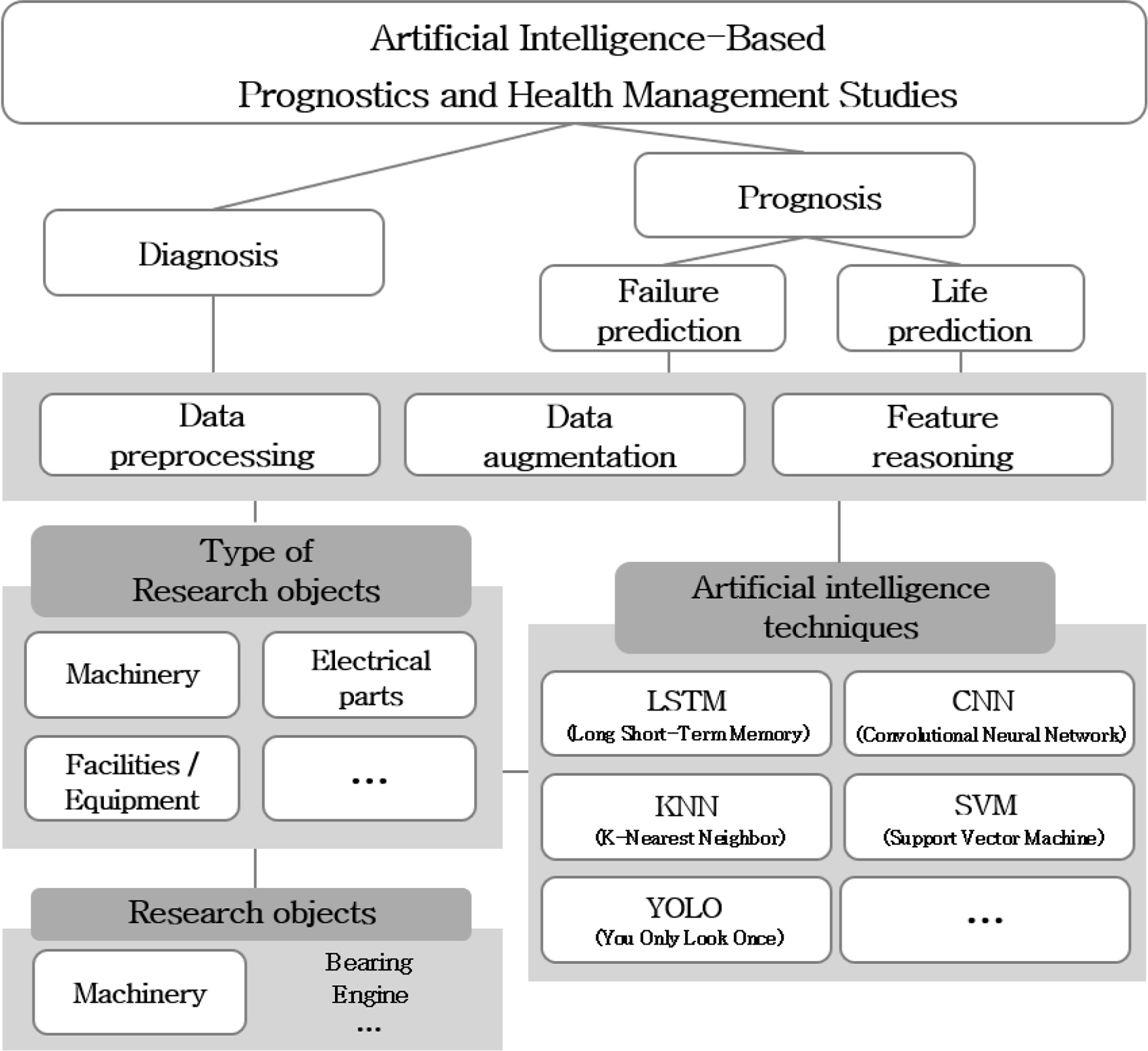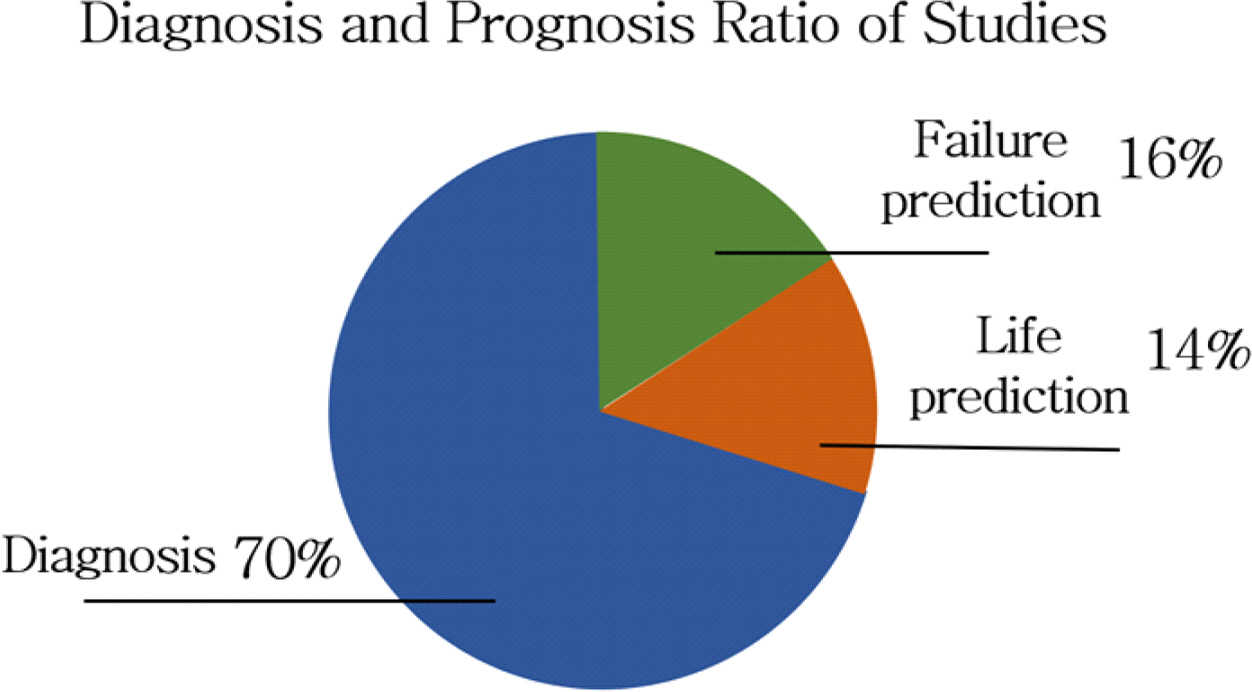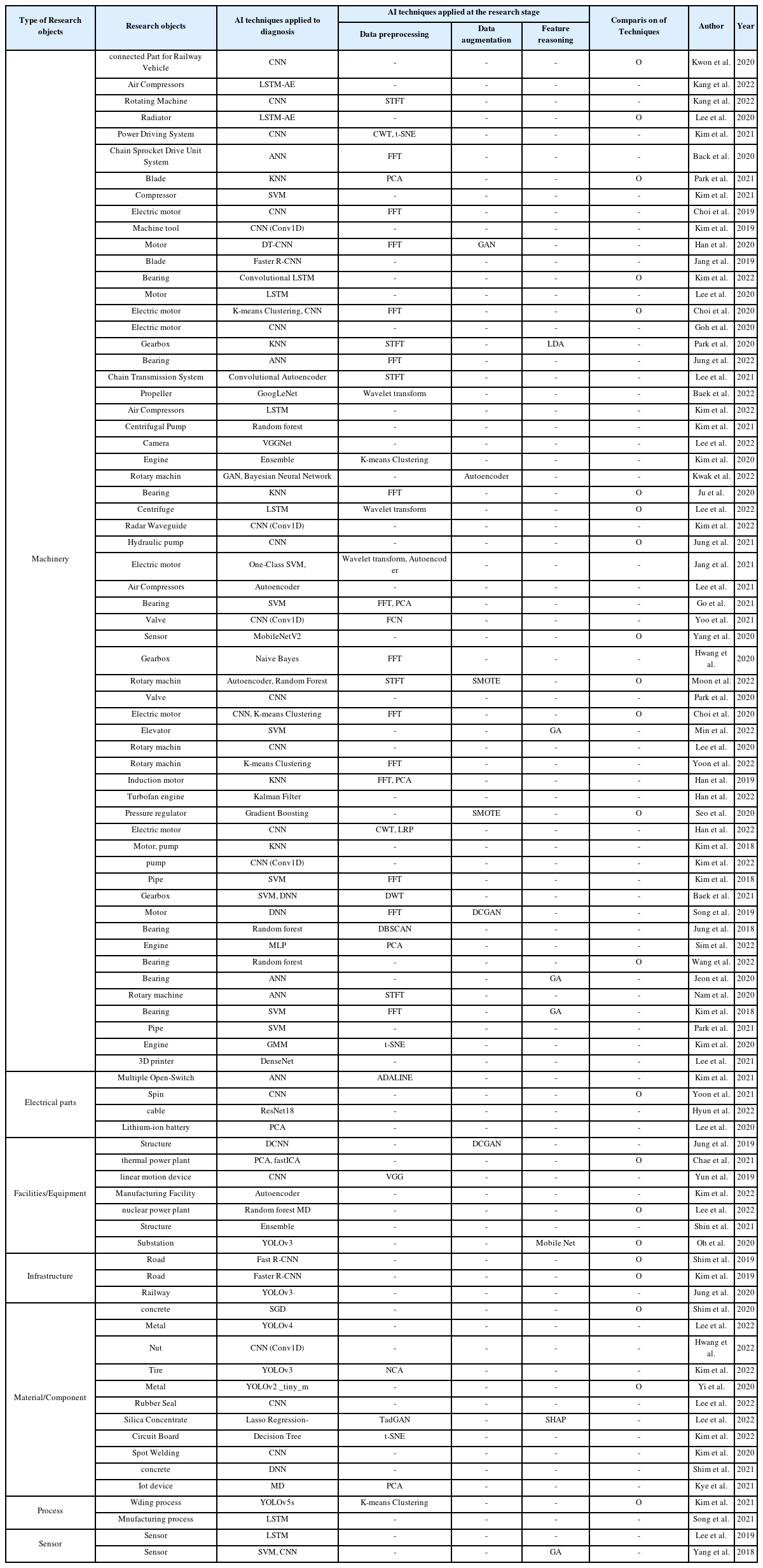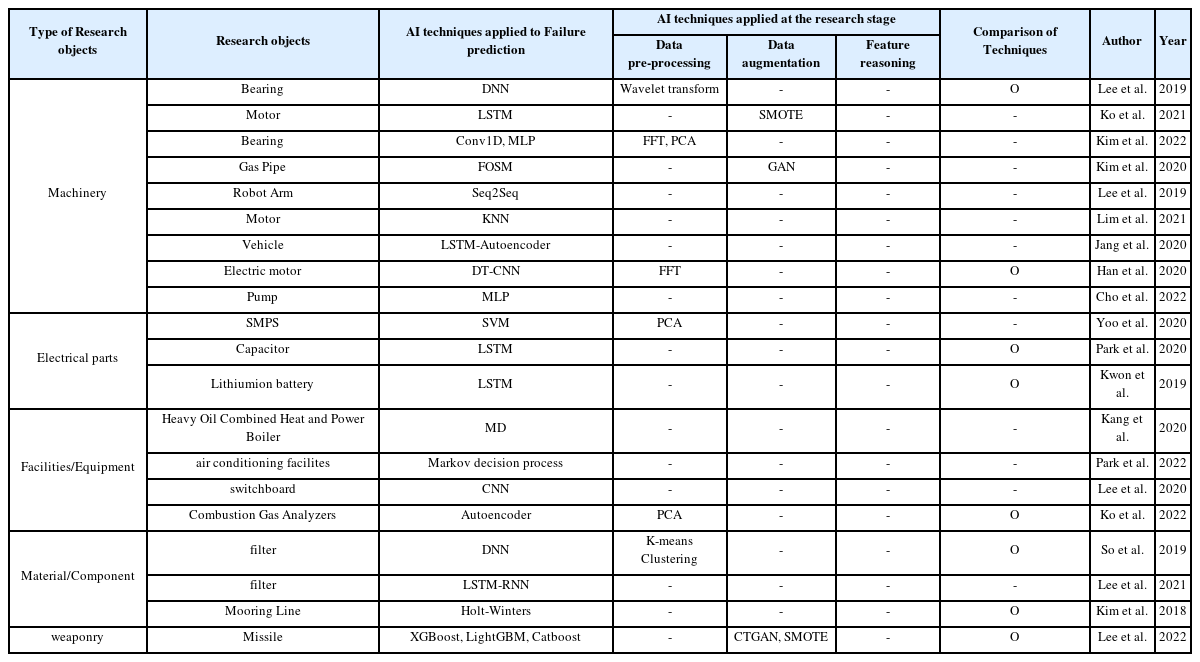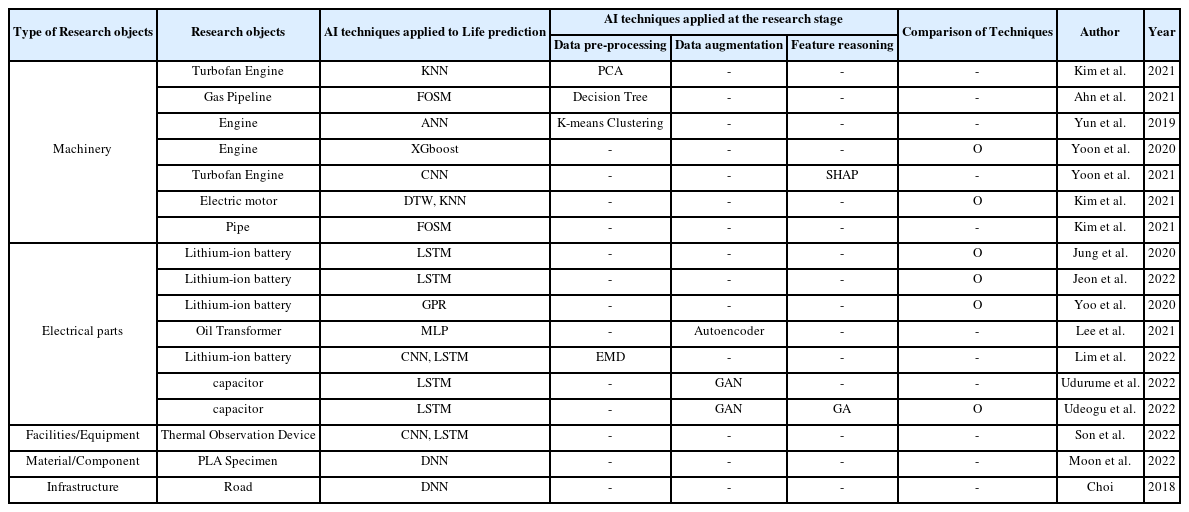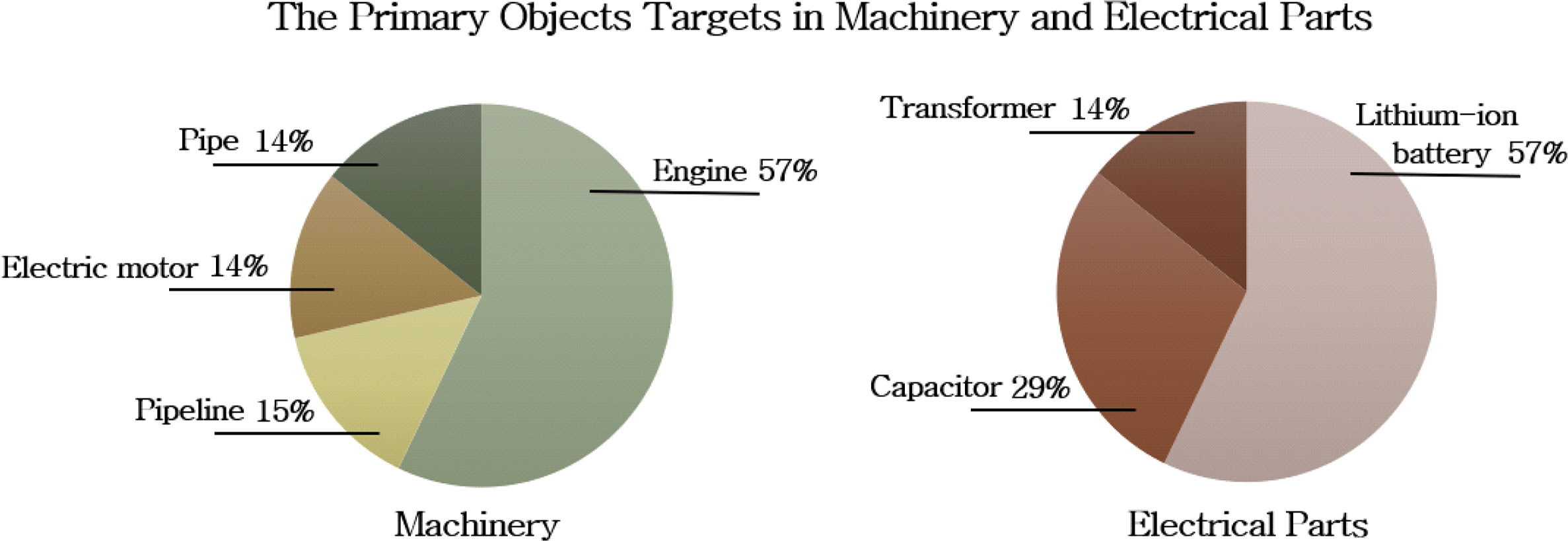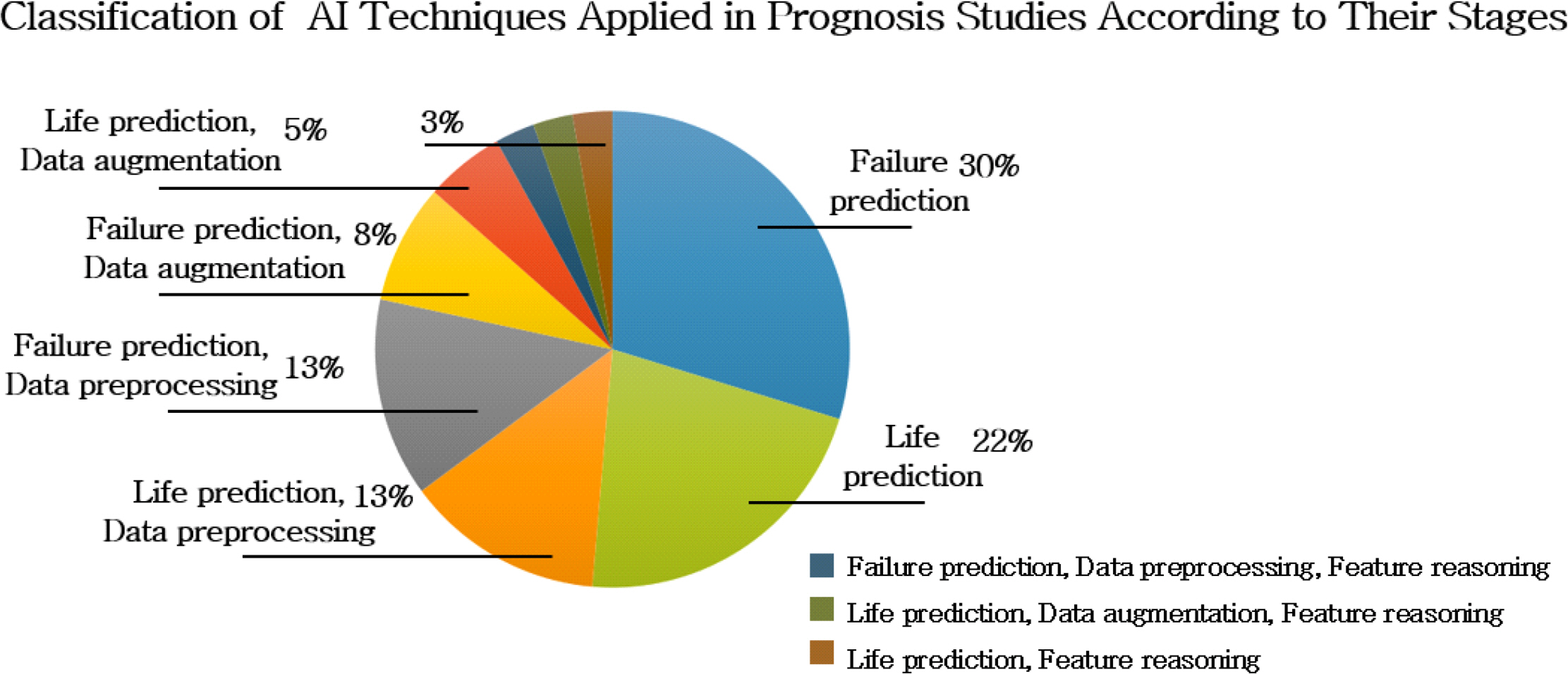References
Ahn Y. G., Kim S. J., Kim D. H., Kim C. M., Kim W. S.. 2021;Remaining Life Prediction Using Gas Pipeline Segmentation Algorithm Based on Decision Tree. Journal of Applied Reliability 21(2):173–180.
Back J. S., Kim S. W., Lee S. K., Lee C. H.. 2020;Conditioning Monitoring in Chain Sprocket Drive Unit System Based on Artificial Neural Network. Transactions of the Korean Society for Noise and Vibration Engineering 30(3):286–293.
Baek H. S., Shin J. H., Kim S. J.. 2021;Development of AI-Based Condition Monitoring System for Failure Diagnosis of Excavator’s Travel Device. Journal of Drive and Control 18(1):24–30.
Baek S. D., Woo J. H.. 2022;Fault Detection of Propeller of an Overactuated Unmanned Surface Vehicle based on Convolutional Neural Network. Journal of the Society of Naval Architects of Korea 59(2):125–133.
Baik J. W.. 2019;AI Techniques for Prognostics and Health Management. Journal of Applied Reliability 19(3):243–255.
Chae S. G., Kim G. R., Bae B. Y., Bae S. J.. 2021;Failure Diagnosis and Prediction for a Thermal Power Plant Generator using fastICA. Journal of Applied Reliability) (Journal of Applied Reliability 21(4):341–351.
Cho J, H. 2022;A Study on the Operation Status Monitoring, Diagnosis and Failure Prediction Algorithm of Smart ESP. Journal of Next-generation Convergence Technology Association 6(5):775–780.
Choi D. J, Han J. H., Park S. U, Hong S. K.. 2020;Motor Fault Diagnosis in Changed Environments using K-Means and CNN. Journal of Institute of Control, Robotics Systems 26(5):348–354.
Choi D. J., Han J. H., Hong S. K.. 2019;Real-Time Self-Complement System of Fault Diagnosis for Induction Motor Using Machine Learning and IoT Technique. The Transactions of the Korean Institute of Electrical Engineers 68(5):662–669.
Choi D. J., Han J. H., Park S. H., Hong S. K.. 2020;Deep Learning Motor Failure Diagnosis System Considering Small IoT Devices. Journal of institute of control robotics and systems 26(11):900–906.
Choi S. H., Do M. S.. 2018;Prediction of Asphalt Pavement Service Life using Deep Learning. International Journal of Highway Engineering 20(2):57–65.
Fink O., Wang Q., Svensen M., Dersin P., Lee W. J., Ducoffe M.. 2020;Potential, challenges and future directions for deep learning in prognostics and health management applications. Engineering Applications of Artificial Intelligence 92:952–1976.
Go J. I., Lee E. Y., Lee M. J., Choi S. D., Hur J. W.. 2021;Corrosion Failure Diagnosis of Rolling Bearing with SVM. Journal of the Korean Society of Manufacturing Process Engineers 20(9):35–41.
Goh Y. J., Kim G. N., Kim Y. H., Lee B., Kim K. M.. 2020;Diagnosis Method for Stator-Faults in Induction Motor using Park’ s Vector Pattern and Convolution Neural Network. Institute of Korean Electrical and Electronics Engineers 24(3):883–889.
Ha S., Kim D. H.. 2022;Deep Learning based Semiconductor Wafer Maps Clustering Considering Outliers. Journal of Applied Reliability 22(4):342–351.
Han D. J., Kim S. J., Lee S, C.. 2022;A Realization of Real Time Algorithm for Fault and Health Diagnosis of Turbofan Engine Components. Journal of The Korean Society Aeronautical and Space Sciences 50(10):717–727.
Han J. H., Choi D. J., Park S. U., Hong S. K.. 2020;A Study on the GAN Algorithm Performance Improvement Method in Motor Failure Diagnosis Using Deep Learning Algorithm. The Transactions of the Korean Institute of Electrical Engineers 69(11):1732–1739.
Han J. H., Choi D. J., Park S. W., Hong S. K.. 2020;DT-CNN based Motor Failure Prediction Considering Outlier Data. Journal of institute of control robotics and systems 26(11):932–939.
Han J. H., Park S. W., Hong S. K.. 2022;Performance Evaluation of the Continuos Wavelt Transformation Data in Motor Fault Diagnosis through XAI Algorithm. The Transactions of the Korean Institute of Electrical Engineers 71(7):225–232.
Han S. B.. 2019;Study on the Development of Diagnosis Algorithm for Induction Motor Using Current and Magnetic Flux Sensors. Journal of IEEE Korea Council 23(4):42–50.
Hwang G. Y., Jeong S. M., Oh J. S.. 2022;Development of Prediction Algorithm Featuring 1-D CNN for Vehicle Wheel Nuts. Transactions of the Korean Society for Noise and Vibration Engineering 32(4):337–345.
Hwang S. Y., Lee J. H., Kim K. S., Oh J. W., Min C. H.. 2020;Development of Real-time Condition Monitoring System Based on Machine Learning for Winch Equipment of Floating Crane. Journal of Computational Design and Engineering 25(4):445–454.
Hyun D. H., Lee S. H.. 2022;Defect Detection in Manufacturing System Using Continual Learning. Korean Journal of Computational Design and Engineering 27(1):10–18.
Jang J. G., Noh C. M., Kim S. S., Lee S.S, Lee J. C. 2021;Vibration Data Denoising and Performance Comparison Using Denoising Auto Encoder Method. Journal of the Korean Society of Marine Environment & Safety 27(7):1088–1097.
Jang J. W., An H. J., Lee J. H., Shin S. B.. 2019;Construction of Faster R-CNN Deep Learning Model for Surface Damage Detection of Blade Systems. Journal of the Korea Institute for Structural Maintenance and Inspection 23(7):80–86.
Jang M. H., Park H.S, Kim J. I., Oh J. R., Jun H. B.. 2020;A Case Study on Predicting the Vehicle Failure Code with Gathered Diagnostic Trouble Code Data. Korean Journal of Computational Design and Engineering 25(4):358–365.
Jeon H. K., Kim J. S., Kim B. J., Kim W. J.. 2022;A study on the fault diagnosis of rotating machine by machine learning. The Journal of the Acoustical Society of Korea 39(4):263–269.
Jeon J. H., Cheon H. J., Chu Y. J., Kim H. S.. 2022;Deep-Learning Based Lithium-ion Battery SOH Estimation Using Multi-Channel Charging Profile and Discharge Capacity. Journal of Korean Institute of Communications and Information Scien 47(6):862–869.
Ju Y. J., Kim M. S., Kim K. S., Lee J. H.. 2020;Comparison of Machine Learning Algorithms Applied to Classification of Operating Condition of Rotating Machinery. Journal of Computational Design and Engineering 25(1):77–87.
Jung H., Park M. S.. 2018;A Study of Big data-based Machine Learning Techniques for Wheel and Bearing Fault Diagnosis. Journal of the Korea Academia-Industrial cooperation Society 19(1):75–84.
Jung J. H., Kim D. H., Kim C.S, Oh R. D., Ahn JH.. 2020;Intelligent Railway Detection Algorithm Fusing Image Processing and Deep Learning for the Prevent of Unusual Events. Journal of Internet Computing and Services 21(4):109–116.
Jung J. H., Sun K. H., Kim K.. 2021;Fault Diagnosis Method for Excavator Hydraulic Axial Piston Pumps. Journal of The Korean Society for Fluid Power and Construction Equipments 18(4):98–103.
Jung S. J., Hur J. W.. 2020;Deep Learning Approaches to RUL Prediction of Lithium-ion Batteries. Journal of the Korean Society of Manufacturing Process Engineers 19(12):21–27.
Jung S. M., Choi W. J.. 2022;A Study on Deep Learning-based Fault Diagnosis using Vibration Data of Wind Generato. Journal of Korean Institute of Information Technology 20(6):129–136.
Jung W. H., Jeong D. H., Kim Y. H., Kim C. H., Lee H. S., Yu H. J., Ryu J. H., Oh H. S.. 2019;Deep Generative Models to Overcome an Insufficient Data Problem in Structural Health Diagnosis. Journal of the Korean Society of Mechanical Engineers 43(3):169–176.
Kang M. G, Hyun Y.H., Lee C.B.. 2022;“Deep Learning-Based Analysis for Abnormal Diagnosis of Air Compressors.”. Journal of the Korean Society for Precision Engineering 39(3):209–215.
Kang M. Y., Lee C. B.. 2022;Development of Prognostics and Health Management System for Rotating Machine and Application to Rotary Table. Journal of the Korean Society for Precision Engineering 39(5):337–343.
Kang S. B., Lee H. H., Oh J. S., Choi K. S.. 2020;Fault Prediction of a Heavy Oil Combined Heat and Power Boiler Using Machine Learning. The Transactions of the Korean Society of Mechanical Engineers 44(5):341–346.
Kim D. H., Kim S. J., Kim W. S., Kim C. M.. 2020;A Generative Adversarial Network based Data Generating for Estimation of Remaining Life Distribution in Gas Pipes. Journal of Korean Institute of Intelligent Systems 30(1):80–85.
Kim D. H., Lee J. H., Lee S. B., Jung B. K.. 2020;Outlier detection of main engine data of a ship using ensemble method. Journal of the Korean Society of Fisheries and Ocean Technology 56(4):384–394.
Kim D. H., Lee S. B., Lee J. H.. 2020;Anomaly detection of Vessel Main Engine Big Data using Gaussian Mixture Model. Journal of the Korean Data Analysis Society 22(4):1473–1489.
Kim H. J., Ha J. M., Ahn B. H., Park D. H., Choi B. K.. 2018;Failure Classification of Gearbox using Ultrasonic Signal Characteristic. Transactions of the Korean Society for Noise and Vibration Engineering 28(1):57–63.
Kim H. J., Kim K. S., Hwang S. Y., Lee J H.. 2022;The Fault Diagnosis Model of Ship Fuel System Equipment Reflecting Time Dependency in Conv1D Algorithm Based on the Convolution Network. Journal of Korean Navigation and Port Research 46(4):367–374.
Kim H. S., Ko D. B., Lee W. G., Bae Y. S.. 2022;A Study on Tire Surface Defect Detection Method Using Depth Image. Proceedings of the Korea Information Processing Society Conference 11(5):211–220.
Kim I. J., Kim W. S., Kim J. Y., Chae H. S., Woo J. Y., Do K. M., Lim S. H., Shin M. S., Lee J. E., Kim H.. 2022;Discovering Essential AI-based Manufacturing Policy Issues for Competitive Reinforcement of Small and Medium Manufacturing Enterprises. Journal of Korean Society for Quality Management 50(4):647–664.
Kim I. S., Lee M. G., Jeon Y. H.. 2021;Comparative Analysis of Defect Detection Using YOLO of Deep Learning. Journal of the Korean Society of Manufacturing Technology Engineers 30(6):514–519.
Kim J. H., Shin J. H., Kim T. H.. 2022;Low-latency Bearing Fault Diagnosis based on Convolutional LSTM Model. Journal of The Institute of Electronics and Information Engineers 59(1):124–130.
Kim J.M, Hyeon S. G., Chae J. H., Do M. S.. 2019;Road Crack Detection based on Object Detection Algorithm using Unmanned Aerial Vehicle Image. The Journal of The Korea Institute of Intelligent Transportation Systems 18(6):155–163.
Kim J. S., Lee G. B., Hwang H. S., Ahn J. S., Oh J. R., Jang M. H., Jun H. B.. 2021;A Study on DTW-based RUL Estimation Algorithm of Propulsion Motor: Case Study. Korean Journal of Computational Design and Engineering 26(4):386–397.
Kim J. T., Seo Y. W., Lee S. S., Kim S. J., Kim Y. G.. 2021;A Proposal of Remaining Useful Life Prediction Model for Turbofan Engine based on k-Nearest Neighbor. Journal of the Korea Academia-Industrial cooperation Society 22(4):611–620.
Kim J. W., Jang J. S., Yang M. S., Kang J. H., Kim K. W., Cho Y. J., Lee J. W.. 2019;A Study on Fault Classification of Machining Center using Acceleration Data Based on 1D CNN Algorithm. Journal of the Korean Society of Manufacturing Process Engineers 18(9):29–35.
Kim J. Y., Jeong I. G., Kim J. M.. 2018;Acoustic Emission based early fault detection and diagnosis method for pipeline. Asia-pacific Journal of Multimedia Services Convergent with Art, Humanities, and Sociology 8(3):571–578.
Kim K. H., Kim S. M., Kim Y. S.. 2023;A Study on Optimization of Classification Performance through Fourier Transform and Image Augmentation. Journal of Korean Society for Quality Management 51(1):119–129.
Kim K. W., Kang J. H., Park S. H.. 2021;A Machine Learning-Based Signal Analytics Framework for Diagnosing the Anomalies of Centrifugal Pumps. Journal of the Korean Society for Precision Engineering 38(4):269–277.
Kim M. H., Jin K. H.. 2022;Development of a Deep Learning Algorithm for Anomaly Detection of Manufacturing Facility. Journal of the Korea Institute of Information and Communication Engineering 26(2):199–206.
Kim M. J., Cho H. J., Kang C. G.. 2022;LSTM-based Anomaly Detection for Screw Air Compressors of Railway Vehicles. Journal of the Korean Society of Mechanical Engineers 46(2):195–202.
Kim N. J., Bae Y. C.. 2018;Status Diagnosis of Pump and Motor Applying K-Nearest Neighbors. Journal of The Korea Institute of Electronic Communication Sciences 13(6):1249–1256.
Kim S. I., Noh Y. J., Kang Y. J., Park S. H., Ahn B. H.. 2021;Fault Classification Model Based on Time Domain Feature Extraction of Vibration Data. Journal of the Computational Structural Engineering Institute of Korea 34(1):25–33.
Kim S. J.. 2021;Application of Fuzzy Logic Based Machine Learning to the Assessment of Failure Probability and Remaining Useful Life for Corroded Pipes. Journal of Korean Institute of Intelligent Systems 31(3):185–191.
Kim S. J., Choe B. H., Kim W. S.. 2017;Prognostics for Industry 4.0 and Its Application to Fitness-for-Service Assessment of Corroded Gas Pipelines. Journal of Korean Society for Quality Management 45(6):649–664.
Kim S. M., Lee H. Y. L., Hwang I. S., Hur J. W.. 2022;Analysis of Fault Diagnosis Algorithm for Thermal Imaging Camera Circuit Board Using Machine Learning. Journal of the Korea Academia-Industrial cooperation Society 23(10):118–124.
Kim S. W., An K. H., Back J. S., Lee S. K., Lee C. H., Kim P. G.. 2021;Health Monitoring of Power Driving System Using Sound Signal based on Deep Learning. Transactions of the Korean Society for Noise and Vibration Engineering 31(1):47–56.
Kim W. J., Kim S. H.. 2021;ANN-Based Diagnostic Method on Multiple Open-Switch Fault for Three-Phase PWM Converters. The Transactions of the Korean Institute of Electrical Engineers 70(5):764–775.
Kim Y. G., Kim J. W.. 2020;Development of Aigorithm for Predicting the Electrode Life of Spot Welding on Automotive Steel Plate. Journal of the Korean Society of Mechanical Technology 22(5):871–876.
Kim Y. G., Son M. J., Noh S. C., Kim S. J.. 2022;A Study on Prevention of Condensation and Freezing in Radar Waveguide using Condition Based Maintenance. Journal of the Korea Academia-Industrial cooperation Society 23(7):229–239.
Kim Y. J., Shin J. H., Hwang H. J., Jun H. B.. 2018;A Study on Prognostics Approach for Estimating the RUL of Mooring Line. Korean Journal of Computational Design and Engineering 23(3):202–214.
Kim H. J., Hwang S. Y., Kim G. S., Kim K. M., Lee J. H.. 2022;Performance of Conv1D Model Considering Both Non-stationarity and the Time Interval Applied to the Condition Diagnosis of Rotary Fuel Pump. Korean Journal of Computational Design and Engineering 27(4):550–559.
Ko D. H., Choi W. H., Choi S. D., Hur J. W.. 2021;Failure Prognostics of Start Motor Based on Machine Learning. Journal of the Korean Society of Manufacturing Process Engineers 20(12):85–91.
Ko H. C., Seok K. H., Lee J. H., Park J. H., Kim S. W.. 2022;Application of Virtual Sensors for Fault Detection and Back-up of Combustion Gas Analyzers in a Steel Plant Furnace. Journal of Institute of Control, Robotics and Systems 28(8):708–713.
Kwak M. S., Lee J. S.. 2022;Diagnosis-Based Domain-Adaptive Design Using Data Augmentation and Transfer Learning. Journal of Mechanical Science and Technology 46(11):975–986.
Kwon S. G., Han D. H., Park S. Y., Kim J. H.. 2019;Long Short Term Memory-Based State-of-Health Prediction Algorithm of a Rechargeable Lithium-Ion Battery for Electric Vehicle. The Transactions of the Korean Institute of Electrical Engineers 68(10):1214–1221.
Kwon S. J., Kim M. S.. 2020;“Flaw Evaluation of Bogie connected Part for Railway Vehicle Based on Convolutional Neural Network.”. Journal of the Korea Academia-Industrial cooperation Society 21(11):53–60.
Kye H. S., Kwon M. H.. 2021;PCA-Based Low-Complexity Anomaly Detectio. The Journal of Korean Institute of Communications and Information Sciences 46(6):941–955.
Lee B. S.. 2021;Development of Deep Learning Model to Estimate Clogging of Stormwater Infiltration Filter. Journal of the Korea Academia-Industrial cooperation Society 22(9):147–155.
Lee C. Hun, Lee S. K., Kim P. I.. 2021;Fault Detection and Diagnosis of Chain Transmission System Using Convolutional Auto-encoder. Transactions of the Korean Society for Noise and Vibration Engineering 31(5):563–573.
Lee D. K., Park J. W., Cho S.H,, Lee J.S.. 2022;Maintainability Prediction of Guided Missile based on Machine Learning using Field Data. Journal of the Korea Academia-Industrial cooperation Society 23(2):518–526.
Lee G. H., Lee Y. D., Koo I. S.. 2019;An RNN-based Fault Detection Scheme for Digital Sensor. The Journal of The Institute of Internet, Broadcasting and Communication 19(1):29–35.
Lee H. J., Kim S. S.. 2022;Analysis of Anomaly Diagnosis on Operation Data in Nuclear Power Plant using Mahalanobis Distance and Random Forest. Journal of Korean Institute of Intelligent Systems 32(2):133–138.
Lee J. G., Kim D. H.. 2020;Case Study on Fault Diagnosis of Radiator Using LSTM Autoencoder. Journal of Korean Institute of Next Generation Computing 16(26):17–25.
Lee J. H.. 2021;Experimental Study on Application of an Anomaly Detection Algorithm in Electric Current Datasets Generated from Marine Air Compressor with Time-series Features. Journal of the Korean Society of Marine Environment & Safety 27(1):127–134.
Lee J. H., Kwon M. G., Kim Y. B., Hur J. W.. 2022;Failure Diagnostics of Camera Image Sensor For Vehicle Using CNN. Journal of the Korea Academia-Industrial cooperation Society 23(12):877–884.
Lee J. H., Yoo S. Y., Shin S. C., Kang D. H., Lee S. S., Lee J. C.. 2019;Fault diagnosis of bearings using machine learning algorithm. Journal of the Korean Society of Marine Engineering 43(6):455–462.
Lee N. J., Kim S. M., Jeong I. J., Sohn S. M., Lee S. C.. 2020;Ensemble Method using Rule-based and Deep-learning Algorithms for Rotating-machine Diagnostics. The Korean Society for Noise and Vibration Engineering 30(2):129–135.
Lee P. Y., Kwon S. G., Kang D. H., Han S. Y., Kim J. H.. 2020;SOH Estimation and Feature Extraction using Principal Component Analysis based on Health Indicator for High Energy Battery. The Transactions of the Korean Institute of Power Electronics 25(5):376–384.
Lee S. H., Kang S. H., Shin Y. S., Choi O. K., Kim S. J., Kang J. Mo.. 2022;YOLO-Based Detection of Metal Surface Defects. Journal of korean institute of Intelligent Systems 32(4):275–285.
Lee S. H., Kim B., Lee H. S.. 2021;An Oil Transformer Life Estimation System Using an Autoencoder Based on a Generative Model. Journal of the korean sosiety for railway 24(7):619–624.
Lee S. H., Kim J. Y., Lee J.J, Kim Y. J., Kim S. K., Lee T. H.. 2022;A Study on the Development of Database and Algorithm for Fault Diagnosis for Condition Based Maintenance of Rubber Seal in Ancillary Equipment of Autonomous Ships. Journal of Applied Reliability 22(1):48–58.
Lee S. H., Kim Y. S.. 2022;A Pre-processing Process Using TadGAN-based Time-series Anomaly Detection. Journal of Korean Society for Quality Management 50(3):459–471.
Lee S. H., Wesonga S., Park J. S.. 2022;Classification of Operating State of Screw Decanter using Video-Based Optical Flow and LSTM Classifier. Journal of the Korean Society of Industry Convergence 25(2):169–176.
Lee S. I, Ko D.S.. 2020;A Study on the Design of Prediction Model for Safety Evaluation of Partial Discharge. Journal of platform technology 8(3):10–21.
Lee S. Y., Huh Y. J.. 2021;A Study on Real-Time Defect Detection System Using CNN Algorithm During Scaffold 3D Printing. Journal of the Semiconductor & Display Technology 20(3):125–130.
Lee Y. H., Kim K. J., Lee S. I., Kim D. J.. 2019;Seq2Seq model-based Prognostics and Health Management of Robot Arm. Journal of Korea Institute of Information, Electronics, and Communication Technology 12(3):242–250.
Lee Y. K., Hong S. C., Hong J. K.. 2020;LSTM-based Drone’s Anomal Motor Vibration Detection System. Journal of Information Technology and Architecture 17(4):315–321.
Lim J. K., Yoon H. J.. 2021;A study on the Feature extraction of the Rolling Stock door using the current value of the motor and the selection of a failure diagnosis prediction algorithm. The Transactions of the Korean Institute of Electrical Engineers 70(1):96–101.
Lim J. Y., Kim D. H., Noh T. W., Lee B. K.. 2022;Remaining Useful Life Prediction for Litium-Ion Batteries Using EMD-CNN-LSTM Hybrid Method. The Transactions of the Korean Institute of Power Electronics 27(1):48–55.
Min T. H., Park D. H., Lee J. J., Seo S. Y., Kang S. W., Choi B. G.. 2022;Feature-based Analysis on Vibration Signals for Fault Diagnosis of Elevator. Transactions of the Korean Society for Noise and Vibration Engineering 32(6):535–543.
Moon H. C., Noh W. S., Ryu H. S., Doh J. Y.. 2022;Deep Neural Network-Based Reliability Assessment on Fatigue Life of PLA Specimens Considering Uncertainty of Additive Manufacturing. Journal of Applied Reliability 22(1):37–47.
Moon K. Y., Kim H. J., Hwang S. Y., Lee J. H.. 2022;Comparison of Prediction Accuracy Between Classification and Convolution Algorithm in Fault Diagnosis of Rotatory Machines at Varying Speed. Journal of Korean Navigation and Port Research 46(3):280–288.
Nam J. I., Park H. J.. 2020;A Neural Network based Fault Detection and Classification System Using Acoustic Measurement. Journal of the Korean Society of Manufacturing Technology Engineers 29(3):10–215.
Oh S. T., Kim H. W., Cho S. H., You J. H., Kwon Y. S., Ra W. Sang., Kim Y. K.. 2020;Development of a Compressed Deep Neural Network for Detecting Defected Electrical Substation Insulators using a Drone. Journal of institute of control robotics and systems 26(11):884–890.
Park H. J, Cho S. H, Jang K. H., Seol J. W., Kwon B. G., Kwon J. Y., Choi J. H.. 2020;Study on Fault Diagnosis of Planetary Gearbox in Unmanned Aerial Vehicle Using Multi sensor Data. Journal of Applied Reliability 20(4):332–342.
Park J. H., Seok J. H., Cheon K. M., Hur J. W.. 2020;Machine Learning Based Failure Prognostics of Aluminum Electrolytic Capacitors. Journal of the Korean Society of Manufacturing Process Engineers 19(11):94–101.
Park J. I., Kang U. G.. 2022;Design of particulate matter reduction algorithm by learning failure patterns of PHM-based air conditioning facilites. Journal of The Korea Society of Computer and Information 27(7):83–92.
Park J. W., Kim W., Jung B. C., Moon S. J., Yang S. J.. 2021;SVM-based Damage Detection Technique Using Smart Valves in a Pipeline System. Journal of the Korean Society of Mechanical Technology 45(11):1019–1028.
Park S. H., Do J. S., Choi S. D., Hur J. W.. 2021;Fault Diagnosis of Drone Using Machine Learning. Journal of the Korean Society of Manufacturing Process Engineers 20(9):28–34.
Park S. M., Ko J. H., Song S. G., Park S. J., Son N. R.. 2020;Fault Diagnosis Algorithm of Electronic Valve using CNN-based Normalized Lissajous Curve. Journal of Korean Society of Industry Convergence 23(5):825–833.
Seo C. Y., Suh Y. J., Kim D. J.. 2020;Study on Fault Detection of a Gas Pressure Regulator Based on Machine Learning Algorithms. Journal of The Korea Society of Computer and Information 25(4):19–27.
Shim S. B., Choi S. I., Kong S. M., Lee S. W.. 2020;Adversarial learning for underground structure concrete crack detection based on semi-supervised semantic segmentation. Journal of Korean Tunnelling and Underground Space Association 22(5):515–528.
Shim S. B., Choi S. I., Kong S. M., Lee S. W.. 2021;Deep learning algorithm of concrete spalling detection using focal loss and data augmentation. Journal of Korean Tunnelling and Underground Space Association 23(4):253–263.
Shim S. B., Chun C. J., Ryu S. K.. 2019;Road Surface Damage Detection based on Object Recognition using Fast R-CNN. The Journal of The Korea Institute of Intelligent Transportation Systems 18(2):104–113.
Shin Y. S., Min K. W.. 2021;Decentralized Structural Diagnosis and Monitoring System for Ensemble Learning on Dynamic Characteristics. Journal of the Computational Structural Engineering Institute of Korea 34(4):183–189.
Sim K. C., Lee K. S., Byun S. H.. 2022;A study on fault diagnosis of marine engine using a neural network with dimension-reduced vibration signals. The Journal of the Acoustical Society of Korea 41(5):492–499.
So M. S., Shin J. H.. 2019;Performance Degradation Prediction of Industrial Equipment using Machine Learning. Korean Journal of Computational Design and Engineering 24(3):268–279.
Son M. J., Kim Y. G., Noh S. C., Kim M. H., Kim K. M.. 2022;Exploring the Application of CBM+ in an ISR Weapon System, Thermal Observation Device. Journal of Applied Reliability 22(3):240–247.
Song H. B., Jeong Jun. 2019;The Implementation of Smart Motor Diagnosis. Journal of Korean Institute of Information Technology 17(4):27–36.
Song Y. U., Baek S. J.. 2021;Real-Time Fault Detection in Discrete Manufacturing Systems Via LSTM Model based on PLC Digital Control Signals. Journal of Korean Society of Industrial and Systems Engineering 44(2):115–123.
Udeoguw C. U., Caliwag A. C., Lim W. S.. 2022;Remaining Useful Life Prediction for Supercapacitors Using an Optimized End-to-End Deep Learning Approach. The Journal of Korean Institute of Communications and Information Sciences 47(3):482–491.
Udurumew M., Udeogu C. U., Caliwag A. C., Lim W. S.. 2022;Synthetic Data Generation Using GAN for RUL Prediction of Supercapacitors. The Journal of Korean Institute of Communications and Information Sciences 47(3):492–500.
Wang D. H., Lee J. H., Kim S. J., Kim M. C., Lee I. S.. 2022;Fault Diagnosis of Induction Motor using an Ensemble Method of Decision Tree and Multilayer Neural Network. Journal of Korean Institute of Intelligent Systems 20(3):47–55.
Yang J. W., Lee Y. D., Koo I. S.. 2020;Timely Sensor Fault Detection Scheme based on Deep Learning. The Journal of The Institute of Internet, Broadcasting and Communication 20(1):163–169.
Yang J. W., Lee Y. D., Koo I. S. 2018;Sensor Fault Detection Scheme based on Deep Learning and Support Vector Machine. The Journal of The Institute of Internet, Broadcasting and Communication 18(2):185–195.
Yi K. Y., Jeong S. J., Seo K.S.. 2020;Embedded Deep Learning System for Defects Detection. The Transactions of the Korean Institute of Electrical Engineers 69(2):325–330.
Yoo S. J., Jang D. S., Park J. W., Lee J. K.. 2021;Fault Diagnosis of Hydraulic Solenoid Valves using Artificial Intelligence. Journal of The Korean Society for Fluid Power and Construction Equipments 18(4):92–91.
Yoo S. W., Shin Y. B., Shin D. I.. 2020;Comparison of the Machine Learning Models Predicting Lithium-ion Battery Capacity for Remaining Useful Life Estimation. Journal of the Korean Institute of Gas 24(6):91–97.
Yoo Y. S., Kim D. H., Kim S., Hur J. W.. 2020;Fault Prognostics of a SMPS based on PCA-SVM. Journal of the Korean Society of Manufacturing Process Engineers 19(9):47–52.
Yoon I. G., Min H. R., Lee S.. 2022;Automatic Detection of the Dominant Frequency in Rotating Facilities. Journal of Mechanical Science and Technology 46(5):495–502.
Yoon S. J., Lee M. Y., Lee J. H., Lee S. H., Na J. C.. 2021;Fault Diagnosis Using Artificial Intelligence for the Spindle of Machine Tools. Transactions of the Korean Society of Mechanical Engineers 45(5):401–408.
Yoon Y. A., Jung J. H., Lim J. H., Chang T. W., Kim Y. S.. 2020;A study on Data Preprocessing for Developing Remaining Useful Life Predictions based on Stochastic Degradation Models Using Air Craft Engine Data. Journal of Korean Society of Industrial and Systems Engineering 43(2):48–55.
Yoon Y. A., Lee S. H., Kim Y. S.. 2021;A Study on the Remaining Useful Life Prediction Performance Variation based on Identification and Selection by using SHAP. Journal of Korean Society of Industrial and Systems Engineering 44(4):1–11.
Yun J. P., Kim M. S., Koo G. W., Shin C.. 2019;Fault Diagnosis and Analysis Based on Transfer Learning and Vibration Signals. IEMEK Journal of Embedded Systems and Applications 14(6):287–294.
Yun Y. R., Kim S. G., Cho S. H., Choi J. H.. 2019;Neural Network based Aircraft Engine Health Management using C-MAPSS Data. Journal of Aerospace System Engineering 13(6):17–25.

